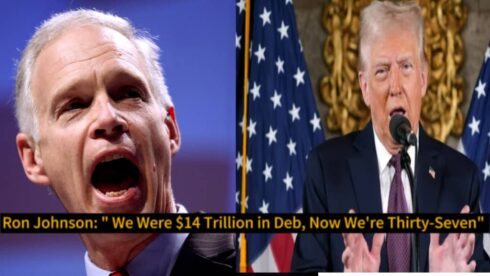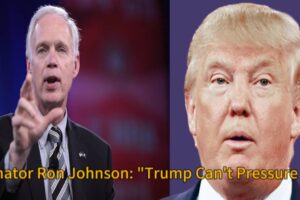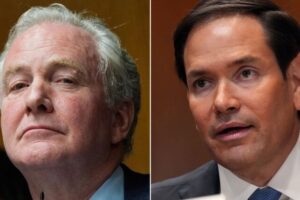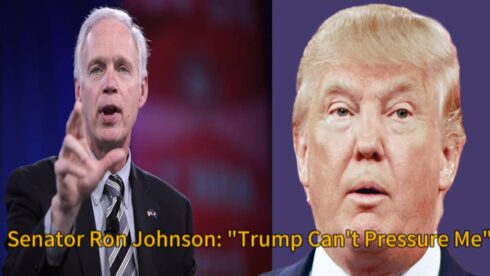Ron Johnson didn’t hold back as he dismissed the House’s passage of Donald Trump’s signature legislative package as a reckless display of fiscal irresponsibility. “They just kept talking about $1.5 trillion. They set the bar way too low,” Johnson told reporters, mocking the celebratory tone MAGA Republicans adopted. His critique wasn’t just a warning shot—it was a full-throated rejection of what he calls “rhetorical deception” packaged as reform.
Ron Johnson continued his assault by emphasizing the bill’s failure to address the root issue: America’s ballooning debt. “The goal should have been to reduce average annual deficits, not to pass one big, beautiful bill,” he said. He branded the bill’s language as political theater, designed to excite Trump’s base while distracting from fiscal rot beneath the surface.
Ron Johnson: “Trump Can’t Pressure Me”
Ron Johnson made it unmistakably clear that he is not swayed by Trump’s political intimidation tactics. “In the House, President Trump can threaten a primary, and those guys want to keep their seats. I understand the pressure. Can’t pressure me that way,” he stated firmly, drawing a line in the sand. His words highlight a growing defiance in the Senate, where individual convictions may outweigh party loyalty.
Ron Johnson, who launched his political career during the Tea Party wave in 2010, invoked his original purpose: to combat national debt. “I ran in 2010 because we were mortgaging our children’s future. It’s wrong,” he said. His message is clear: while Trump controls the House through fear, the Senate won’t roll over so easily.
Ron Johnson: “We Were $14 Trillion in Debt, Now We’re Thirty-Seven”
Ron Johnson raised the alarm about America’s fiscal path, describing the bill as a dangerous catalyst accelerating the country’s economic collapse. “We were $14 trillion in debt, now we’re thirty-seven,” he warned. “And we’re on a path to over $60 trillion.” With his signature blend of bluntness and economic pessimism, Johnson painted a grim picture of America’s financial health.
Ron Johnson pointed to bond markets as a reflection of investor anxiety. “Have you been watching what the bond markets are doing in relation to the one big, beautiful bill? They’re not thinking it’s very big or beautiful,” he added. This isn’t just about ideology; it’s about financial stability, and Johnson insists the bill is already shaking investor confidence.
Ron Johnson: “Someone’s Got to Be the Dad”

Ron Johnson compared the American economic dilemma to a parent making tough choices. “Everybody likes the tax cut,” he admitted, “but when you’re $37 trillion in debt… somebody’s got to be the dad that says, ‘I know everybody wants to go to Disney World, but we just can’t afford it.’” This paternal analogy underscores his belief that fiscal responsibility must override political popularity.
Ron Johnson is positioning himself as the adult in a room full of reckless spenders. With Social Security running dry and interest on the national debt surging, he views the bill’s appeal as dangerously short-term. “I guess that’s what’s going to have to happen here in the Senate,” he said, foreshadowing a showdown where prudence may finally confront populism.
Ron Johnson: “This Bill Is a Social and Fiscal Disaster”
Ron Johnson’s opposition isn’t just about numbers—it’s about consequences. While the bill slashes taxes for the wealthy, it simultaneously guts Medicaid and could leave over 7 million Americans uninsured, according to the Congressional Budget Office. Johnson’s silence on the bill’s social impact is telling—his fiscal critique may be just the tip of the iceberg.
Johnson’s resistance has inadvertently amplified progressive outrage, as activists point to the bill’s environmental destruction. It guts clean energy funding and dismantles anti-pollution efforts at a time when climate change is intensifying. Johnson’s fiscal honesty opens the door for a broader critique: the bill prioritizes military might and corporate giveaways over health, climate, and the vulnerable.
Ron Johnson: “This Bill Will Not Glide Through the Senate”
Johnson’s words may mark the beginning of a Senate mutiny. “So, I guess, I guess that’s what’s going to have to happen here in the Senate,” he hinted, referring to a potential GOP blockade. With several fiscally conservative senators echoing his concerns privately, the bill’s path forward is anything but guaranteed.
Johnson’s defiance has become a rallying cry—not just for deficit hawks, but for anyone alarmed by the bill’s moral and economic costs. As pressure mounts, Johnson stands poised to shape the future of the legislation. Whether he becomes a hero or a heretic within the GOP may depend on how many others follow his lead in resisting Trump’s latest “big, beautiful” gamble.














